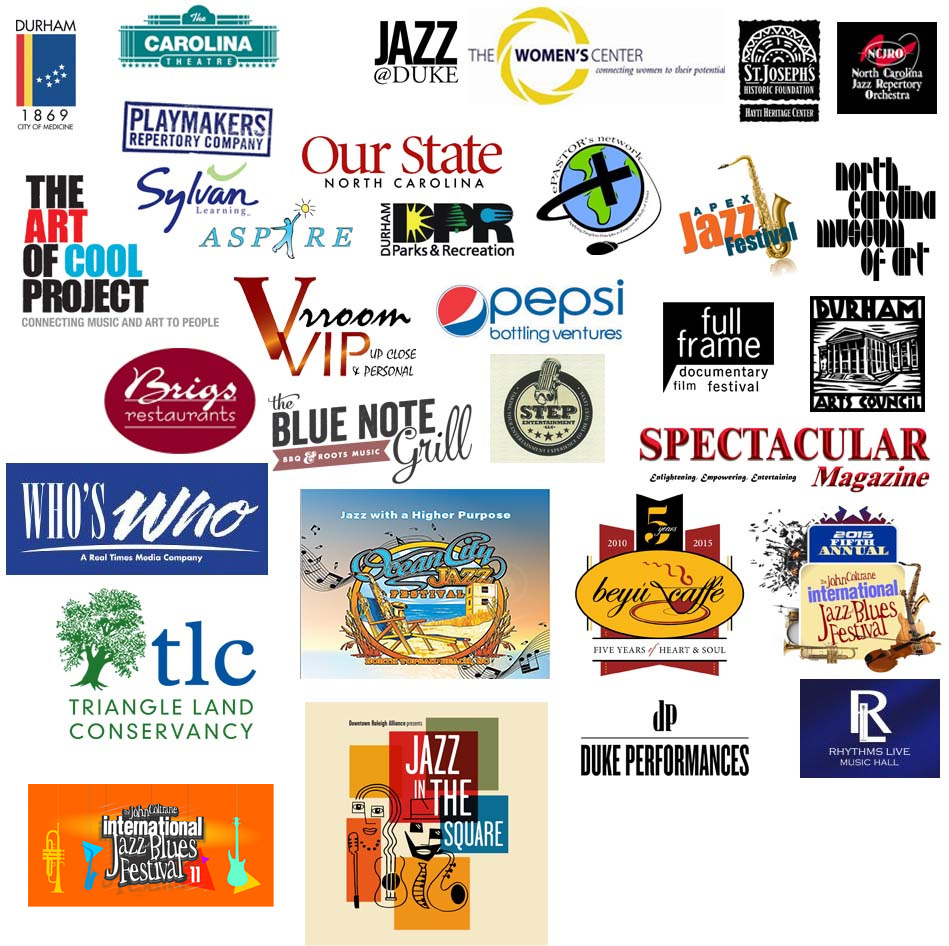Author Archive
Saturday, January 8th, 2011
North Carolina Central University will celebrate the life and legacy of Dr. Martin Luther King Jr. with a week of events from Monday, Jan. 10, through Monday, Jan. 17. All events are free and open to the public.
On Monday, NCCU will host a Share Our Shoes Rally from 11 a.m. to 2 p.m. in the Alfonso Elder Student Union. Gently used shoes will be collected and donated to Share Our Shoes (SOS), a Raleigh nonprofit, in support of the Haiti Project. SOS, in partnership with NCCU men’s basketball coach Levelle Moton, who is the official SOS spokesperson, has set a goal of collecting 1 million pairs of shoes to donate to Haiti. The rally will include raffle prizes from event sponsors including Rapid Fitness, Fleet Feet Sports, Omega Sports, Sonics and Foot Solutions, as well as a presentation by the NCCU men’s basketball team and a final weigh-in of all the shoes collected.
A Unity March and wreath-laying ceremony at the Centennial Garden will take place on Tuesday at 10:40 a.m. The Durham community is invited to meet at the front entrance of the Alfonso Elder Student Union and proceed to the Centennial Garden, where two wreaths honoring Dr. King and Coretta Scott King will be placed. Event speakers include North Carolina NAACP President Dr. William Barber as well as NCCU faculty and staff.
On Wednesday, NCCU law professor Timothy Peterkin will provide an overview of the contemporary civil rights movement at noon in the Turner Law Building, Room 102. Peterkin will discuss the 14th and 15th amendments and the implications of fair and equal applications of the law on the lives of citizens in the United States. The first 50 participants will receive lunch.
Civil Rights giant and U.S. Congressman John Lewis (D – Ga.) will speak at the Martin Luther King Convocation on Thursday, Jan. 13, at 9:45 a.m. in the McDougald–McLendon Gymnasium. Lewis has been called “one of the most courageous persons the civil rights movement ever produced,” and has dedicated his life to protecting human rights and securing civil liberties. Lewis has served in the U.S. House of Representatives since 1986. During the convocation, the university will present its first MLK Social Justice Awards.
The MLK Man Up Conference will take place on Saturday, Jan. 15, in the Alfonso Elder Student Union from 9 a.m. to 2 p.m. The conference is designed to bring males together to build skills that enhance personal development. Several workshop topics will be presented including: Spirituality and Wellness, Working Through Difficult Relationships, Living in an E-World and Recalling the Journey. A networking luncheon will round out the day.
NCCU and Habitat for Humanity will break ground on the third Eagle Habitat home on Monday, Jan. 17. The home is at 609 Hickory St., near the NCCU campus. Volunteers are needed from 8 a.m. to noon and noon to 4 p.m.
Additional events include “Remembering Haiti: What Can We Do Now?” film and discussion at 6 p.m., on Jan. 10, in the student union, and the annual Fulfilling the Dream Blood Drive on Jan. 17, from 3 p.m. to 7:30 p.m., in the Miller-Morgan Building.
For more information on any of the MLK events, contact the Alfonso Elder Student Union at (919) 530-6486.
Posted in Public Affairs | 7 Comments »
Saturday, January 8th, 2011
In celebration of MLK Week, the Academic Community Service Learning Program is sponsoring a “Share Our Shoes Rally” on Monday, Jan. 10, from 11 a.m. to 2 p.m. in the Alfonso Elder Student Union. Gently used shoes will be collected and donated to Haitian earthquake victims and local communities through Share Our Shoes (SOS), a nonprofit organization in Raleigh. NCCU’s men’s basketball Coach Levelle Moton has been named the official spokesperson of SOS and is supporting the organization’s goal of collecting 1 million pairs of shoes for Haiti. The rally will include prizes from event sponsors including: Rapid Fitness, Omega Sports, Fleet Feet Sports, Foot Solutions and Sonics.
Shoe donation boxes can be found throughout the campus in the following locations:
1. Student Union
2. School of Education
3. Edmonds Classroom Building
4. Miller-Morgan Building
5. Mary Townes Science Building
6. Cottage One (Academic Community Service Learning Program)
7. Student Services Building
8. School of Business
9. Hubbard-Totton Building
10. University Police
11. Physical Plant (front office)
12. McDougald-McLendon Gymnasium (Coach Moton’s office)
13. All Residence Halls (first floor)
Share Our Shoes is a shoe charity dedicated to providing shoes for those in desperate need. To date, Share Our Shoes has sent 395,000 pairs to the Haiti earthquake victims, 27,000 pairs to flood victims in Nashville, Tenn., and more than 10,000 pairs to local homeless, elderly and financially struggling families.
For more information, contact the Academic Community Service Learning Program at 530-6143.
Posted in Public Affairs | 7 Comments »
Thursday, January 6th, 2011
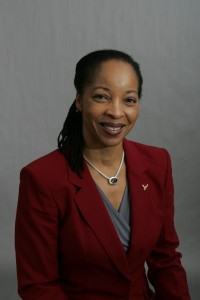 Lois Deloatch, a longtime fundraiser at Duke University, has been appointed vice chancellor for Institutional Advancement at North Carolina Central University. Deloatch comes to NCCU having served 20 years at Duke as an associate director of corporate and foundation relations. Before that, she worked as a development project specialist, development officer, major gifts officer, and interim director of development for Duke University Libraries. In addition to her fundraising work, she helped to establish the John Hope Franklin Collection of African and African-American Documentation at Duke’s Perkins Library. Lois Deloatch, a longtime fundraiser at Duke University, has been appointed vice chancellor for Institutional Advancement at North Carolina Central University. Deloatch comes to NCCU having served 20 years at Duke as an associate director of corporate and foundation relations. Before that, she worked as a development project specialist, development officer, major gifts officer, and interim director of development for Duke University Libraries. In addition to her fundraising work, she helped to establish the John Hope Franklin Collection of African and African-American Documentation at Duke’s Perkins Library.
“Deloatch’s long experience cultivating North Carolina philanthropy for higher education and her commitment to this community made her a perfect fit for this job,” said NCCU Chancellor Charlie Nelms.
Deloatch fully understands the challenge of the position.
“My first priority is to help establish the infrastructure to enhance the reliability of our interactions with donors,” said Deloatch. “They need to be assured that we will be there to serve them as they seek to make a difference in the lives of our students.”
Deloatch has been recognized statewide for her commitment and leadership as a volunteer, having served on numerous boards and committees including Triangle United Way, Volunteer Center of Greater Durham, Durham Partnership for Seniors, Durham Arts Council, Gregory B. Davis Foundation, and the North Carolina Arts Council.
In addition to her work in university advancement, Deloatch has maintained a career as a professional vocalist and songwriter, specializing in jazz, blues, and spirituals. She has released four recordings and has performed widely in the United States and abroad. She has conducted extensive research on African-American music and is a longtime supporter of the NCCU Jazz Studies Program and WNCU radio station, where she hosted “Sunday Evening Classics.”
A native of Northampton County, Deloatch holds a Bachelor of Arts degree from UNC-Chapel Hill and a Master of Arts from Duke.
Posted in Public Affairs | 5 Comments »
Tuesday, January 4th, 2011
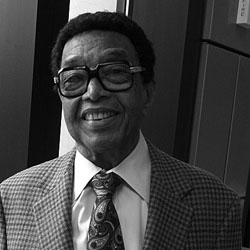 Dr. Billy Taylor, a Jazz pianist, composer, educator and broadcaster who encompassed that rare combination of creativity, intelligence, vision, commitment and leadership, qualities that made him one of our most cherished national treasures, died in New York on December 28, 2010. He was 89 and lived in Riverdale, New York. Dr. Billy Taylor, a Jazz pianist, composer, educator and broadcaster who encompassed that rare combination of creativity, intelligence, vision, commitment and leadership, qualities that made him one of our most cherished national treasures, died in New York on December 28, 2010. He was 89 and lived in Riverdale, New York.
The distinguished ambassador of the jazz community to the world-at-large, Dr. Billy Taylor’s recording career spanned over six decades. He also composed over three hundred and fifty songs, as well as works for theatre, dance and symphony orchestras.
Among his most notable works is “I Wish I Knew How It Would Feel to Be Free”, achieving great popularity with Civil Rights Movement of the 1950s and 1960s. Nina Simone covered the song in her 1967 album Silk and Soul, and the song continues to be recorded by many artists worldwide, most recently by Levon Helm.
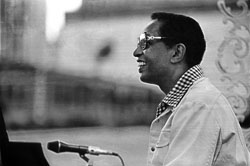 Playing the piano professionally since 1944, he got his start with Ben Webster’s Quartet on New York’s famed 52nd Street. He then served as the house pianist at Birdland, the legendary jazz club where he performed with such celebrated masters as Charlie Parker, Dizzy Gillespie and Miles Davis. Starting in the 1950s, Billy Taylor ked his own Trio, as well as performed with the most influential jazz musicians of the twentieth century. Playing the piano professionally since 1944, he got his start with Ben Webster’s Quartet on New York’s famed 52nd Street. He then served as the house pianist at Birdland, the legendary jazz club where he performed with such celebrated masters as Charlie Parker, Dizzy Gillespie and Miles Davis. Starting in the 1950s, Billy Taylor ked his own Trio, as well as performed with the most influential jazz musicians of the twentieth century.
After many years of recording for leading record labels, in 1989, Taylor started his own “Taylor Made” record label to document his own music, releasing four albums, and in the late 90s, “Soundpost Records,” releasing his two final recordings.
Dr. Taylor was not only been an influential musician, but a highly regarded teacher as well, receiving his Masters and Doctorate in Music Education from the University of Massachusetts at Amherst and serving as a Duke Ellington Fellow at Yale University.
He also hosted and programmed such radio stations WLIB and WNEW in New York, and several award winning series for National Public Radio. In the early 1980s, Taylor became the arts correspondent for CBS Sunday Morning.
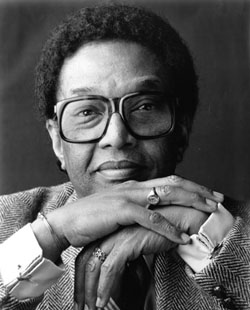 Dr. Billy Taylor was one of only three jazz musicians appointed to the National Council of the Arts, and also served as the Artistic Advisor for Jazz to the Kennedy Center for the Performing Arts, where he developed one acclaimed concert series after another including the Louis Armstrong Legacy series, and the annual Mary Lou Williams Women in Jazz Festival. Dr. Billy Taylor was one of only three jazz musicians appointed to the National Council of the Arts, and also served as the Artistic Advisor for Jazz to the Kennedy Center for the Performing Arts, where he developed one acclaimed concert series after another including the Louis Armstrong Legacy series, and the annual Mary Lou Williams Women in Jazz Festival.
With over twenty three honorary doctoral degrees, Dr. Billy Taylor was also the recipient of two Peabody Awards, an Emmy, a Grammy and a host of prestigious and highly coveted prizes, such as the National Medal of Arts, the Tiffany Award, a Lifetime achievement Award from Downbeat Magazine, and, election to the Hall of Fame for the International Association for Jazz Education.
Dr. Taylor’s survivors include his wife, Theodora and his daughter, Kim Taylor-Thompson and son-in-law, Tony Thompson. A son, Duane, passed away in 1988.
Source: www.billytaylorjazz.com
Posted in Artist of the Month | 3 Comments »
Tuesday, January 4th, 2011
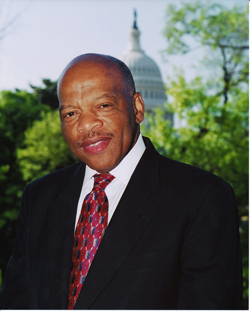 Civil Rights giant and U.S. Congressman John Lewis (D – Ga.) will speak at the Martin Luther King Convocation at North Carolina Central University on Jan. 13. The convocation will begin at 9:45 a.m. in the McDougald–McLendon Gymnasium. It is part of a weeklong observance honoring the life and legacy of Dr. Martin Luther King Jr. Civil Rights giant and U.S. Congressman John Lewis (D – Ga.) will speak at the Martin Luther King Convocation at North Carolina Central University on Jan. 13. The convocation will begin at 9:45 a.m. in the McDougald–McLendon Gymnasium. It is part of a weeklong observance honoring the life and legacy of Dr. Martin Luther King Jr.
Lewis has been called “one of the most courageous persons the civil rights movement ever produced” and has dedicated his life to protecting human rights and securing civil liberties. As a student at Fisk University, Lewis organized sit-ins at segregated lunch counters in Nashville, Tenn. In 1961, he participated in the Freedom Rides, which challenged segregation at interstate bus terminals across the South. Despite being beaten by angry mobs and arrested by police, Lewis continued to defy and fight against the injustice of Jim Crow legislation.
In 1963, he was named chairman of the Student Nonviolent Coordinating Committee (SNCC), the organization largely responsible for shaping student activism in the civil rights movement, including voter registration drives and community action programs. Dubbed one of the “Big Six” leaders of the movement along with Whitney Young, A. Phillip Randolph, Martin Luther King Jr., James Farmer and Roy Wilkins, he was the architect and keynote speaker at the historic March on Washington in August of 1963. Lewis was just 23 years old.
In 1965, Lewis led 600 peaceful protesters across the Edmund Pettus Bridge in Selma, Ala., to demonstrate the need for voting rights in the state. Their intention was to march from Selma to Montgomery. At the far end of the bridge, they were met by nearly 200 Alabama state troopers, who brutally attacked the protesters, and one man, James J. Reeb of Boston, was killed. The event became known as “Bloody Sunday.” Photographs of beaten protesters and news coverage captured the brutal confrontation; a week later President Lyndon B. Johnson gave a televised speech before Congress in which he denounced the assault. Two days later, Johnson sent the Voting Rights bill to Congress.
The Voting Rights Act, signed into law on Aug. 6, 1965, empowered the federal government to oversee voter registration and elections in counties that had used tests to determine voter eligibility or where registration or turnout had been less than 50 percent in the 1964 presidential election. It also banned discriminatory literacy tests and expanded voting rights for non-English speaking Americans.
Lewis remained a devoted advocate of nonviolence, despite more than 40 arrests, attacks and injuries. He later served as director of the Voter Education Project, which added nearly 4 million minorities to the voter rolls.
In 1981, he was elected to the Atlanta City Council and in 1986 was elected to the U.S. House of Representatives, representing the city of Atlanta and parts of Fulton, DeKalb and Clayton counties. He is a member of the House leadership as senior chief deputy whip, a member of the Ways and Means Committee, the Subcommittee on Income Security and Family Support and chairman of the Subcommittee on Oversight. He has been called “the conscience of the U.S. Congress” by House Speaker Nancy Pelosi.
Lewis is a graduate of Fisk University, where he earned a bachelor’s degree in religion and philosophy, and American Baptist Theological Seminary. He has received more than 50 honorary degrees and numerous awards, including the only John F. Kennedy Profile in Courage Award for Lifetime Achievement ever granted by the John F. Kennedy Library Foundation. In 1998, he published an autobiography, Walking With the Wind: A Memoir of The Movement. Since then, numerous books have been written about his life, and his voice has been included in several documentaries and news broadcasts on the civil rights movement and public life.
Posted in Public Affairs | 7 Comments »
Sunday, January 2nd, 2011
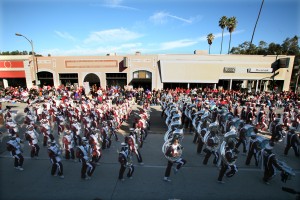 The N.C. Central University Marching Sound Machine’s debut at the Rose Parade on Saturday was a complete success. The tricky 110-degree turn onto Colorado Boulevard? Flawless. The moon-walking dance moves? Smooth as silk. The response of the crowd? Almost louder than the band’s drum line. The N.C. Central University Marching Sound Machine’s debut at the Rose Parade on Saturday was a complete success. The tricky 110-degree turn onto Colorado Boulevard? Flawless. The moon-walking dance moves? Smooth as silk. The response of the crowd? Almost louder than the band’s drum line.
“It went very, very well,” said Brian Henry, tuba player and senior in mass communication at NCCU. “The turn was very easy. Everybody did an excellent job. It was awesome!”
Turquoise Thompson, December graduate in public administration and captain of the auxiliary dance team, said, “It felt like we were doing it for a lot of other people, people who came before us and those who’ll come after. My favorite part was when we finished, we cheered and hugged each other and began rejoicing.”
Sharing in the delight from the grandstand was NCCU Chancellor Charlie Nelms, who reflected on what it took for the band to reach an appearance in the Rose Parade, one of the highest honors a marching band can achieve. 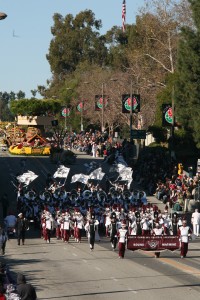
“For the students, it gives them a concrete sense of what it takes — the hard work necessary to achieve excellence on a world stage,” Nelms said. “And that is exactly what they have done. They were superb all week long and I am extremely proud of them. I hope they serve as an inspiration to the entire NCCU family – students, and also faculty, staff and alumni – to know that this small, low-wealth institution can achieve distinction when there’s a confluence of aspiration, expectation, and determination.
“There is no way in the world we could have purchased this kind of exposure,” he added. “This should aid in our efforts to recruit academically and musically talented students. The increased name recognition may help us bring in gifted faculty and students to our other signature programs. And it should make our alumni across the country proud of their alma mater.
“In a similar way, we’re hoping to capitalize on this success for the purposes of fundraising. Although I have to hand it to the parents, band boosters, and all of our supporters, especially including Walmart (the company transported the instruments and luggage across the country in a big-rig truck), who made this such a huge positive experience for our students. We couldn’t have done it without them.”
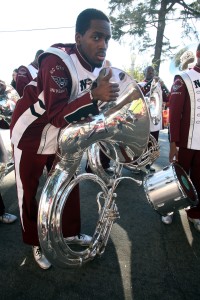 The Marching Sound Machine members weren’t alone in California. A sizable delegation of NCCU fans occupied a strategic place in the grandstand across Colorado Boulevard from the Norton Simon Museum – seated in neutral territory between rival groups from the two universities that would face off in the Rose Bowl football game later in the day, Texas Christian University and the University of Wisconsin. Both universities’ bands gained automatic entry to the Rose Parade. The NCCU contingent maintained the peace as the TCU and Wisconsin fans engaged in some pregame posturing while waiting to cheer their bands. The Marching Sound Machine members weren’t alone in California. A sizable delegation of NCCU fans occupied a strategic place in the grandstand across Colorado Boulevard from the Norton Simon Museum – seated in neutral territory between rival groups from the two universities that would face off in the Rose Bowl football game later in the day, Texas Christian University and the University of Wisconsin. Both universities’ bands gained automatic entry to the Rose Parade. The NCCU contingent maintained the peace as the TCU and Wisconsin fans engaged in some pregame posturing while waiting to cheer their bands.
For TV viewers in the Triangle, there was some disappointment as the NBC and ABC networks ended their live coverage of the parade and turned to other programming before the NCCU band made its dramatic appearance. NCCU officials said they were in contact with television outlets in the Triangle and Los Angeles and would put the word out about online links for viewing the band’s performance.
Posted in Public Affairs | 11 Comments »
Saturday, January 1st, 2011
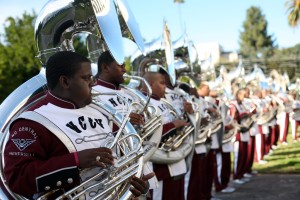 N.C. Central University’s marching band has made a strong impression in just three days in Southern California. N.C. Central University’s marching band has made a strong impression in just three days in Southern California.
At Disneyland on Wednesday and at Thursday’s Bandfest – a showcase at Pasadena City College of all the bands scheduled to march in today’s Rose Parade – the band was placed in the climactic final slot in the schedule.
And for the band’s performance today before its largest audience ever, Tournament of Roses officials have selected the Marching Sound Machine to provide the finale for the 122nd Rose Parade. The band members will step off in 67th position as the last “showcase band” in the parade. The parade starts at 11 a.m. eastern time (8 a.m. in California), so the band will be passing the TV cameras during the third hour of the nationwide parade broadcast – between 1 and 2 p.m. eastern time.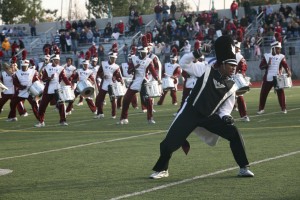
Members of the band say it is their unconventional routines that set them apart from other bands. At the Bandfest, their performance to music by Michael Jackson, and dance routines that audience members compared to Jackson’s video performances, had the crowd stamping the metal bleachers in appreciation.
Roy Ector II, the head drum major, explained the finer points of their routine. The plan for Bandfest, he said, was actually just two days old. Director Jorim Reid rearranges the well-rehearsed drills to keep each major performance fresh. This means that band members must quickly memorize the new order.
“I think about what’s next all the time,” said Ector. “You’re focusing on the destination, the spot.”
The band members perform their intricately choreographed movements by knowing exactly where they need to end up on a memorized chart of a football field, and exactly how many steps it takes to reach their marks.
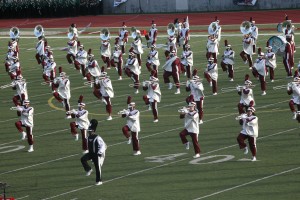 The Bandfest weather late Thursday was unusually chilly for Southern California – barely in the 50s with a stiff breeze, presenting a challenge to the musicians as they struggled to keep their instruments warm. “When the instruments get cold, it changes the sound,” said Ector. The musicians were constantly blowing warm air into their wind instruments to ensure consistent pitch. And the forecast for today’s parade is much the same. The Bandfest weather late Thursday was unusually chilly for Southern California – barely in the 50s with a stiff breeze, presenting a challenge to the musicians as they struggled to keep their instruments warm. “When the instruments get cold, it changes the sound,” said Ector. The musicians were constantly blowing warm air into their wind instruments to ensure consistent pitch. And the forecast for today’s parade is much the same.
The band spent most of Friday about 20 miles from Pasadena in Pomona – rehearsing “until it’s perfect,” said Reid, the band director. Reid was pleased with the band’s scheduled slot toward the end of the parade. The TV audience
Posted in Public Affairs | 3 Comments »
Friday, December 31st, 2010
The 200-plus members of North Carolina Central University’s Marching Sound Machine visited the Rose Bowl for their official photograph on Thursday and then toured the massive tents where volunteers were busy applying all natural materials to the bodies of the Rose Parade floats.
The most elaborate in one tent was the California Polytechnic State University (Cal Poly) float called “Galactic Expedition.” Cal Poly student Sean Conant explained that the float had been in the works since the concept was decided in a contest last February. Half of the float was built at the Cal Poly Pomona campus and half at the Cal Poly San Luis Obispo campus by 100 students from every discipline – including engineering, of course.
The steel frame was covered in foam and painted. And in the last five days, 150 volunteers have been applying more than 30,000 roses, chrysanthemums, and carnations. Two motors will power the float – one to move the vehicle and one to animate the telescopic nose cone, spinning a planet and working a crane that lands an explorer on the surface.
En route to the next stop, the band traveled along the parade route to help the members plan their performance. NCCU Band Director Jorim Reid is particularly concerned with a critical right turn from Orange Grove Boulevard onto Colorado Boulevard.
“I’m worried about that corner,” he said. “It’s 110 degrees, and that’s where they take the pictures.” The additional 20 degrees beyond a standard right-angle turn presents significant challenge as band members try to maintain their straight lines, he said. It’s called the “TV corner,” because that is where the local stations typically set their cameras. It’s considered to be the major test of precision in the Rose Parade.
It doesn’t come as a surprise to the band. Reid has known about it for months. He has measured the corner from satellite images and simulated it with traffic cones on the track at NCCU.
Along the parade route, Reid pointed out the massive bleachers installed in every open space in Pasadena’s downtown shopping district along Colorado Boulevard. “There’ll be hundreds of thousands of people here,” he said. To the members of the band, he pointed out the special blue and red lines painted on the road. The blue line delineates the boundary for the spectators, and the red line is used by float operators – whose field of vision is severely restricted – to keep their floats centered on the road. The bands also use the red line to aid in centering their formations.
One more brief practice tomorrow and the Marching Sound Machine will be ready for Saturday’s New Year’s Day and their first-ever Rose Parade.
Posted in Public Affairs | 2 Comments »
Thursday, December 30th, 2010
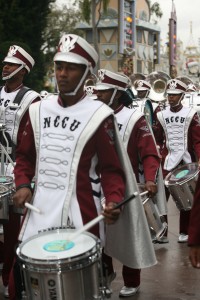 For members of the North Carolina Central University marching band, Tuesday was the longest day – beginning at 2 a.m. packing up in Durham and ending 22 hours later in California with the receipt of their new uniforms. For members of the North Carolina Central University marching band, Tuesday was the longest day – beginning at 2 a.m. packing up in Durham and ending 22 hours later in California with the receipt of their new uniforms.
The new costumes arrived at the hotel just in time for their first performance at Disneyland today. The design is the same as that developed in 2003, but the band members appreciated having bright new uniforms for their Rose Parade performance on New Year’s Day in Pasadena.
Wednesday started off with breakfast and a practice in the ballrooms of their hotel in Anaheim, near Disneyland. “We fine-tuned every piece the ensemble will perform during the trip,” said Turquoise Thompson, December graduate in public administration and captain of the auxiliary dance team.
Then, it was off to Disneyland to march in a parade from the “It’s a Small World” castle down Disneyland’s Main Street. The rain that had been falling all day broke just before the three visiting Rose Parade bands were scheduled to perform. According to a park employee, the bad weather had kept the crowds manageable. A day earlier, Disneyland had to close the gate at 10 a.m. to stem the tide in this holiday season.
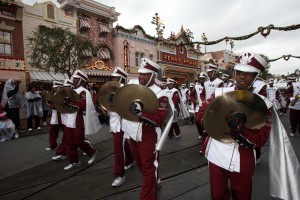 NCCU was the third and last of the Rose Parade bands to perform, and it was the crowd-pleaser with its dance routine and quality sound. Bryan Burch, a junior music education major and trumpet player in the band, said, “We’re just having fun out here – making the most of it.” NCCU was the third and last of the Rose Parade bands to perform, and it was the crowd-pleaser with its dance routine and quality sound. Bryan Burch, a junior music education major and trumpet player in the band, said, “We’re just having fun out here – making the most of it.”
There was no break in the crowd so there was no break in the performance either, said Kenneth Joyner, tenor saxophone player and 2010 graduate in music. This meant the band played Michael Jackson’s “Shake Your Body Down” continuously throughout the park route.
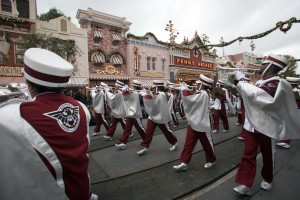 “The audience seemed to enjoy it,” said Joyner. “They saw a different style of marching.” “The audience seemed to enjoy it,” said Joyner. “They saw a different style of marching.”
Tonight the band will have some down time, and many members will take the opportunity to return to the park just for the fun of it.
Posted in Public Affairs | 7 Comments »
Wednesday, December 29th, 2010
The 2 a.m. start for to the trip to California for NCCU’s Marching Sound Machine made for a very quiet flight to Los Angeles. Perhaps that was part of the plan.
Band members and administrators alike on Delta 1755 Tuesday morning were slumped in their seats, eyes closed. The only hint that about half the plane was occupied by Eagles came with the call and response: “Eagle Pride? Amplified!” when the band was welcomed by name by the plane’s captain.
For alto saxophone player Roberta Greene, a freshman in elementary education, this is a first trip to California, but she’s a veteran of middle and high school marching bands. She came to NCCU from Lexington Senior High School in Lexington, N.C., and plays in both the Symphonic and the Marching Sound Machine Bands at the Durham university.
All her thoughts are about the Rose Parade. “Once there, the adrenalin starts pumping and the two hours will fly by fast,” said Greene.
The band has been training for the physical test of the six-mile Rose Parade by marching and playing two hours every day since the beginning of November.
“It takes a lot of stamina to play for two hours,” said Greene. She has been practicing to ensure the consistency of her breathing. “You have to pace yourself but still have energy so the crowd can get pumped up.”
This is a particular concern for Greene as she is asthmatic and is worried about making it through the six miles without having to break formation and use her inhaler.
But Greene is completely confident about NCCU’s ability to deliver a winning performance. “I’m looking forward to our dancing – that separates us from all the other bands.”
There is no lack of confidence among the band members. After a full day of travel, Brian Henry, a junior in mass communication, was ready to go to practice and ready for the Rose Parade.
“It was everyone’s dream to go across the country in their undergrad years…to make the famous turn on Colorado Boulevard. We’re ready to show the world what we’re made of,” said Henry.
Posted in Public Affairs | 2 Comments »
|


 Lois Deloatch, a longtime fundraiser at Duke University, has been appointed vice chancellor for Institutional Advancement at North Carolina Central University. Deloatch comes to NCCU having served 20 years at Duke as an associate director of corporate and foundation relations. Before that, she worked as a development project specialist, development officer, major gifts officer, and interim director of development for Duke University Libraries. In addition to her fundraising work, she helped to establish the John Hope Franklin Collection of African and African-American Documentation at Duke’s Perkins Library.
Lois Deloatch, a longtime fundraiser at Duke University, has been appointed vice chancellor for Institutional Advancement at North Carolina Central University. Deloatch comes to NCCU having served 20 years at Duke as an associate director of corporate and foundation relations. Before that, she worked as a development project specialist, development officer, major gifts officer, and interim director of development for Duke University Libraries. In addition to her fundraising work, she helped to establish the John Hope Franklin Collection of African and African-American Documentation at Duke’s Perkins Library. Dr. Billy Taylor, a Jazz pianist, composer, educator and broadcaster who encompassed that rare combination of creativity, intelligence, vision, commitment and leadership, qualities that made him one of our most cherished national treasures, died in New York on December 28, 2010. He was 89 and lived in Riverdale, New York.
Dr. Billy Taylor, a Jazz pianist, composer, educator and broadcaster who encompassed that rare combination of creativity, intelligence, vision, commitment and leadership, qualities that made him one of our most cherished national treasures, died in New York on December 28, 2010. He was 89 and lived in Riverdale, New York. Playing the piano professionally since 1944, he got his start with Ben Webster’s Quartet on New York’s famed 52nd Street. He then served as the house pianist at Birdland, the legendary jazz club where he performed with such celebrated masters as Charlie Parker, Dizzy Gillespie and Miles Davis. Starting in the 1950s, Billy Taylor ked his own Trio, as well as performed with the most influential jazz musicians of the twentieth century.
Playing the piano professionally since 1944, he got his start with Ben Webster’s Quartet on New York’s famed 52nd Street. He then served as the house pianist at Birdland, the legendary jazz club where he performed with such celebrated masters as Charlie Parker, Dizzy Gillespie and Miles Davis. Starting in the 1950s, Billy Taylor ked his own Trio, as well as performed with the most influential jazz musicians of the twentieth century. Dr. Billy Taylor was one of only three jazz musicians appointed to the National Council of the Arts, and also served as the Artistic Advisor for Jazz to the Kennedy Center for the Performing Arts, where he developed one acclaimed concert series after another including the Louis Armstrong Legacy series, and the annual Mary Lou Williams Women in Jazz Festival.
Dr. Billy Taylor was one of only three jazz musicians appointed to the National Council of the Arts, and also served as the Artistic Advisor for Jazz to the Kennedy Center for the Performing Arts, where he developed one acclaimed concert series after another including the Louis Armstrong Legacy series, and the annual Mary Lou Williams Women in Jazz Festival. Civil Rights giant and U.S. Congressman John Lewis (D – Ga.) will speak at the Martin Luther King Convocation at North Carolina Central University on Jan. 13. The convocation will begin at 9:45 a.m. in the McDougald–McLendon Gymnasium. It is part of a weeklong observance honoring the life and legacy of Dr. Martin Luther King Jr.
Civil Rights giant and U.S. Congressman John Lewis (D – Ga.) will speak at the Martin Luther King Convocation at North Carolina Central University on Jan. 13. The convocation will begin at 9:45 a.m. in the McDougald–McLendon Gymnasium. It is part of a weeklong observance honoring the life and legacy of Dr. Martin Luther King Jr. The N.C. Central University Marching Sound Machine’s debut at the Rose Parade on Saturday was a complete success. The tricky 110-degree turn onto Colorado Boulevard? Flawless. The moon-walking dance moves? Smooth as silk. The response of the crowd? Almost louder than the band’s drum line.
The N.C. Central University Marching Sound Machine’s debut at the Rose Parade on Saturday was a complete success. The tricky 110-degree turn onto Colorado Boulevard? Flawless. The moon-walking dance moves? Smooth as silk. The response of the crowd? Almost louder than the band’s drum line.
 The Marching Sound Machine members weren’t alone in California. A sizable delegation of NCCU fans occupied a strategic place in the grandstand across Colorado Boulevard from the Norton Simon Museum – seated in neutral territory between rival groups from the two universities that would face off in the Rose Bowl football game later in the day, Texas Christian University and the University of Wisconsin. Both universities’ bands gained automatic entry to the Rose Parade. The NCCU contingent maintained the peace as the TCU and Wisconsin fans engaged in some pregame posturing while waiting to cheer their bands.
The Marching Sound Machine members weren’t alone in California. A sizable delegation of NCCU fans occupied a strategic place in the grandstand across Colorado Boulevard from the Norton Simon Museum – seated in neutral territory between rival groups from the two universities that would face off in the Rose Bowl football game later in the day, Texas Christian University and the University of Wisconsin. Both universities’ bands gained automatic entry to the Rose Parade. The NCCU contingent maintained the peace as the TCU and Wisconsin fans engaged in some pregame posturing while waiting to cheer their bands. N.C. Central University’s marching band has made a strong impression in just three days in Southern California.
N.C. Central University’s marching band has made a strong impression in just three days in Southern California.
 The Bandfest weather late Thursday was unusually chilly for Southern California – barely in the 50s with a stiff breeze, presenting a challenge to the musicians as they struggled to keep their instruments warm. “When the instruments get cold, it changes the sound,” said Ector. The musicians were constantly blowing warm air into their wind instruments to ensure consistent pitch. And the forecast for today’s parade is much the same.
The Bandfest weather late Thursday was unusually chilly for Southern California – barely in the 50s with a stiff breeze, presenting a challenge to the musicians as they struggled to keep their instruments warm. “When the instruments get cold, it changes the sound,” said Ector. The musicians were constantly blowing warm air into their wind instruments to ensure consistent pitch. And the forecast for today’s parade is much the same. For members of the North Carolina Central University marching band, Tuesday was the longest day – beginning at 2 a.m. packing up in Durham and ending 22 hours later in California with the receipt of their new uniforms.
For members of the North Carolina Central University marching band, Tuesday was the longest day – beginning at 2 a.m. packing up in Durham and ending 22 hours later in California with the receipt of their new uniforms. NCCU was the third and last of the Rose Parade bands to perform, and it was the crowd-pleaser with its dance routine and quality sound. Bryan Burch, a junior music education major and trumpet player in the band, said, “We’re just having fun out here – making the most of it.”
NCCU was the third and last of the Rose Parade bands to perform, and it was the crowd-pleaser with its dance routine and quality sound. Bryan Burch, a junior music education major and trumpet player in the band, said, “We’re just having fun out here – making the most of it.” “The audience seemed to enjoy it,” said Joyner. “They saw a different style of marching.”
“The audience seemed to enjoy it,” said Joyner. “They saw a different style of marching.”